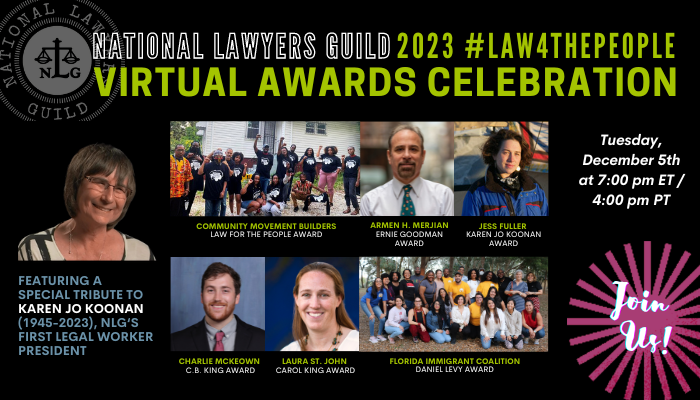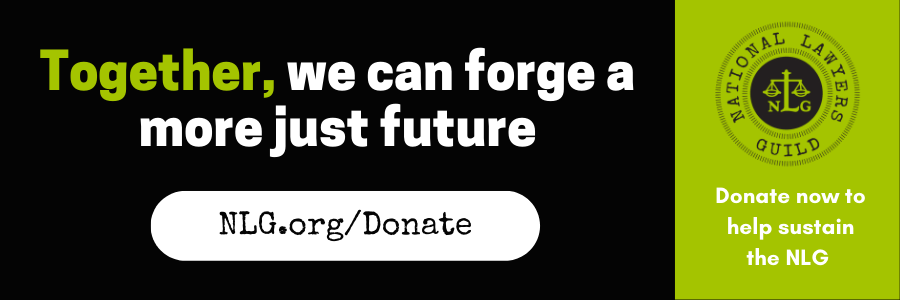Urges administration to recognize students’ decision in upcoming vote
The National Lawyers Guild (NLG) supports Loyola University Chicago (LUC) students seeking the school’s divestment from corporations profiting from the Israeli occupation of Palestine. Set for a vote of March 24, the proposed resolution to divest is a response to the Palestinian call for boycott, divestment, and sanctions (BDS), which aims to compel Israel, through nonviolent direct action, to comply with international law, lift the occupation of Palestine, and recognize the human rights of the Palestinian people.
In March of last year, the LUC Senate unanimously passed a resolution for divestment, but after the administration faced political pressure from some students and pro-Israel groups, a re-vote was held. After a second successful majority vote in favor of the divestment resolution, the student body president vetoed the legislation. Following the veto, the resolution again received a majority vote, but was short of the required two-thirds vote. Despite having faced backlash from select students and the administration, LUC student organizers pushing for divestment have remained unflinchingly determined in their efforts.
Nadine Darwish, President of Loyola Students for Justice in Palestine, says the Loyola chapter has faced increasing repression from administrators, including being placed on probation for demonstrating on campus: “The voices of Palestinian students and students of color have been routinely and systematically silenced at Loyola in the name of more ‘civil’ discourse and private interest groups,” she said.
For the last decade, the BDS movement has for garnered support from human rights groups, activists, and scholars around the world. Yet, dissent against Israel’s foreign policy is often met with repression and at times, retribution—especially within the U.S. At $3.1 billion a year, the U.S. finances Israel’s military occupation more than any other country in the world. In this cultural and political context, dissent against Israeli foreign policy and advocacy of Palestinian human rights is often mischaracterized as anti-Semitism.
Criticism of the BDS movement rests on labels that mischaracterize advocacy for equal rights for Palestinians as anti-Semitism. Across the country, universities and other public and private institutions are being pressured by the Israel Lobby and other Zionist groups to stifle discussions of Palestinian rights. Students’ voices are not the only ones being silenced on campuses—professors critical of Israel’s foreign policy have also faced repression by their administrations, and at times, even retaliation. Just recently, during Israel’s “Operation Protective Edge” offensive on Gaza last summer, Professor Steven Salaita was fired by the University of Illinois at Urbana-Champaign after he made posts to his social media accounts accusing Israel of human rights abuses, in flagrant violation of free speech and academic freedom.
The Guild’s Student National Vice President Nicholas Klaus said: “This is an issue of basic human rights. The oppression of an entire people is at stake, and as members of the NLG, we have implicitly vowed to take a stand against such violence, state sponsored or otherwise. The students at Loyola have taken a brave stand, and in so doing, have put themselves at great risk to those that would enforce the status quo. In my capacity as NLG SNVP, I am proud to stand in solidarity with these students, and offer my full support.”
Criticism of a government, in this case the state of Israel, is qualitatively distinct from hatred of a racial or religious group. Universities have a responsibility to recognize and respect such distinctions and to allow students to develop a rich variety of perspectives on issues of such public importance such as this. To conflate advocacy for Palestinian rights with anti-Semitism not only perpetuates dangerous and unfair mischaracterizations, it also obstructs opportunities for progress in the struggle for human rights. The NLG urges the LUC administration to respect students’ First Amendment rights and the chance to engage in activism that seeks to bring about a freer, more just world.
The National Lawyers Guild was formed in 1937 as the nation’s first racially integrated bar association to advocate for the protection of constitutional, human and civil rights.
# # #


